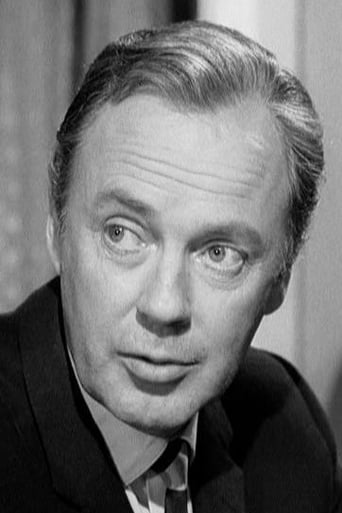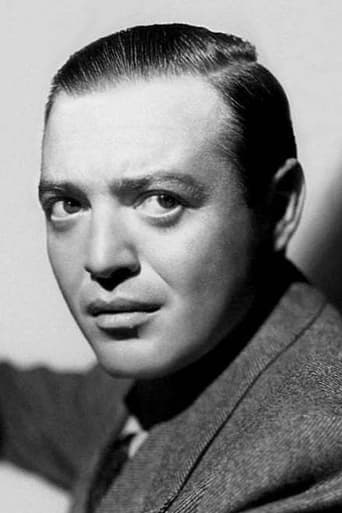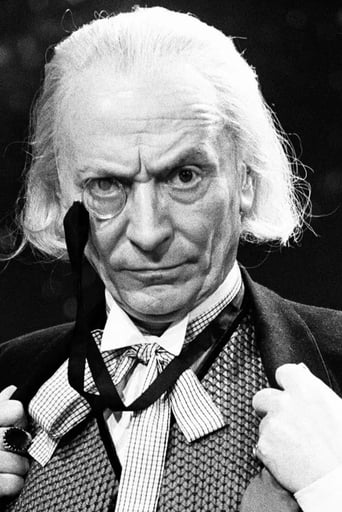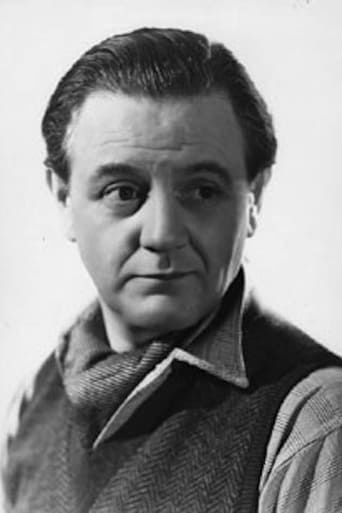CommentsXp
Best movie ever!
FuzzyTagz
If the ambition is to provide two hours of instantly forgettable, popcorn-munching escapism, it succeeds.
Marva
It is an exhilarating, distressing, funny and profound film, with one of the more memorable film scores in years,
Logan
By the time the dramatic fireworks start popping off, each one feels earned.
writers_reign
First let's deal with the sloppy writing: A man gets off a train at night. He is the sole passenger to leave. He asks the porter the way to the 'white cottage', the porter says it's a twenty minute walk. The man asks about a taxi, the porter says, not at this time of night, the man will have to walk along the cliffs. Fair enough but if a train is going to stop and discharge passengers there is likely to be a taxi(s) looking for fares. Later, when asked what train her arrived on and at what time, the man says he came on the mail train and arrived at 3.30. Is it likely there would be a porter on duty at 3.30 a.m? The man walks along the cliffs and is guided by a old salt checking his lobster nets. The next morning we find not a remote hamlet as we supposed but a busy seaside resort full of tourists. Shooting from the beach, pov of the ocean there are NO cliffs visible. There is, however, an interesting cast led by the wooden Derek Farr and the now forgotten Joan Hopkins. Notable among the support is Peter Lorre, William Hartnell, Naunton Wayne, and Kathleen Harrison and Leslie Dwyer who have absolutely nothing to do with the story despite prominent parts. See it for Lorre.
robert-temple-1
This was director Ken Annakin's first film. It shows clearly that he had superior talent from the very beginning of his career. It was particularly interesting for me to see Ken's first film because I knew him so well and he and I worked on something together, so that I am familiar with his working methods. It is only in contemporary times that the old movies made by one's friends are released on DVD and one can see what they did in the beginnings of their careers. Even they themselves rarely had copies of their own early work, because it would have meant having 35mm prints. This film noir is based on a novel by John Garden entitled ALL ON A SUMMER'S DAY, which was published in 1949. It is set at an English seaside resort with the fictitious name of Seagate, which has a pebble beach, a promenade, a very prominent and extensive fairground, is near high cliffs, and is crowded with people on holiday. The actual filming locations were Hastings and Bexhill-on-Sea, which are near each other in East Sussex. In 1950, the British spent their holidays at such places rather than going abroad. That was not only because cheap air travel did not yet exist, but because there were severe limitations on the amount of currency one could take out of the country. No one was permitted to take more than £50 in cash abroad, and credit cards had not yet been invented. (I need to explain all this because younger people today know nothing of the past and hence are liable to misinterpret such things.) The film contains some notable performances. William Hartnell is particularly good as an unscrupulous businessman who does not shy away from violence when necessary. The character actor Edward Rigby is excellent as an 'old salt', a local fisherman who is just going down the deserted cliffside by moonlight to look after his lobster pots at 4 AM when he runs into trouble. Rigby died the next year, having spent 50 years on stage and having appeared in his first film in 1910. The female lead is a particularly charming and delightful actress named Joan Hopkins, who made five feature films between 1947 and 1950 (of which this was the last), appeared in some television dramas, and then in 1954 retired from acting. She married the film director Henry Cass, and she lived to be 87. Her retirement from acting was a great loss to the screen, because she had many of the same qualities as Deborah Kerr and could have had a marvellous lifelong career. Peter Lorre plays a criminally-minded associate of Hartnell, with his usual expert portrayal of an eccentric and neurotic man of disturbed mind and morals. Towards the end of the film, he has to be very dramatic indeed and gives what is usually called 'a towering performance'. In fact those are the most powerful scenes I have ever seen him in, and it is as if he were possessed. Anyone interested in Peter Lorre really needs to see this film. Annakin adds numerous imaginative touches to the film, including scenes with an eccentric and amusing little girl, which have nothing to do with the story but raise the film well above the level of the mediocre. The story is mysterious. Derek Farr, the male lead, arrives at Seagate late at night by the mail train (arriving at 3:30 AM) and walks a long way by moonlight to a lonely cottage at the base of the local cliffs. Strange goings-on occur there, and we hear a shrill scream. Who has done what to whom? Hartnell is there at the cottage, seen by Farr, and shortly afterwards someone else falls from the cliff to the beach, but who is he? It isn't Farr and it isn't Hartnell. Naunton Wayne plays the local police inspector who has to solve the murders of two people on one night, one of whom is under a false name and the other of whom is never seen in the film. The scenes where Farr and Joan Hopkins sit chatting on the beach provide well-placed moments of calm and normality in the midst of a story which swirls with intrigue and tension. The contrast serves to remind us of just how abnormal the wider situation really is. The title refers to more than one person confessing to the same murder. This film has been made with such style and imagination that it is a genuinely superior film noir.
calvinnme
This one started with such promise. A man is walking along a crude path from a hilltop to the beach. He is encountered by an old salt who warns him about the dangerous path. He comes to a cottage, but when he hears the door opening he hides, the man leaving the house looks around, has as a smoke, and goes up the path to the top of the hill. When he is out of sight a man's scream rings out. What a great and mysterious set up. Don't get your hopes up, because it is all downhill or treading water from there.So the next setting is daylight in a beachside amusement park. The man who was hiding in the bushes is asking for a job, (Derek Farr as Jim Medway), but he seems more like he is pumping his old acquaintance for information about two murders the night before. What follows is Medway going to businessman William Hartnell, telling him that he killed his wife (she was the one Medway was going to see at the cottage), but he will tell the police that Hartnell did it because he knows Hartnell was having an affair with his wife. There were plenty of reasons for Hartnell to kill her - Hartnell is married, he didn't want the affair exposed, etc. And Hartnell WAS there. He was the guy leaving the house as Medway approached. Then Medway does what anybody does who threatens a man with lots of power who isn't afraid of violence. He spends a day frolicking at the beach! There is so much going on here it really blunts the power of the story because it has nothing to do with the story and just looks weird in a noir. Medway meets up with a girl who has her own problems - completely non criminal ones. Then there is Hartnell, who to be such a big powerful man of action, really does nothing but pace back and forth in his big office smoking heavily. Peter Lorre is Hartnell's friend who offers to kill Medway and make it look like an accident, and their relationship seems odd. Lorre acts like he looks forward to killing....ANYBODY! And he hovers over Hartnell like he is a little bit in love with him and the sentiment seems to be returned.The last fifteen minutes or so make it almost worth it, but in the meantime you'll just be asking yourself "Where IS this thing going?".
howardmorley
Despite seeing many British 1940s/50s films. this was the first time I had seen "Double Confession".The cast reads like a veritable whose who of well known actors/actresses working in 1950.I have seen Derek Farr playing very anodyne parts in films like "Quiet Wedding" (1941) & its companion film "Quiet Weekend" (1946) but given the right casting he could turn on his thespian power playing the lead in this film.Ronald Howard (who plays the newspaper editor) was 32 when he made this film and looks every inch his father's son.His father being of course the great actor Leslie Howard.Naunton Wayne (in one of his outings without Basil Radford - Charters & Caldicott) plays the police inspector who actually drinks whiskey while on duty!Another film Naunton played solo in 1950 was "Highly Dangerous" with Margaret Lockwood.Kathleen Harrison plays her usual working class role seemingly trying to "pick up" Leslie Dwyer on the beach.Edward Rigby adds his usual colourful local accented character.The only surprise to me was Joan Hopkins whom Derek Farr befriends at the beach resort.I saw a documentary recently and many women who had illegitimate children felt compelled to renounce motherhood for them and send them off for adoption , if it would have caused a family scandal if they had kept them.Joan plays such a mother agonising over this type of moral dilemma.She does have lovely diction and it is always a pleasure to hear beautifully spoken English which actresses were taught in their drama academies at the time.Unlike the two previous reviewers, I notice the mass of user ratings on IMDb rated this 7.3/10 which is good and I too rated it 7/10.I agree the plotting is a bit confused and could have done with better editing but I enjoyed this film nevertheless.




